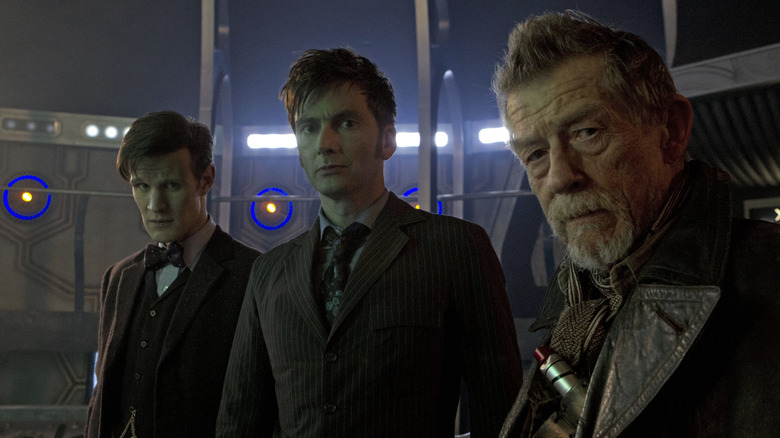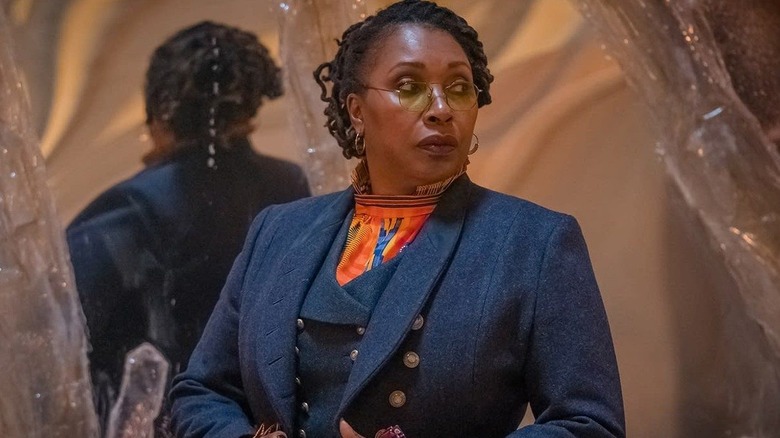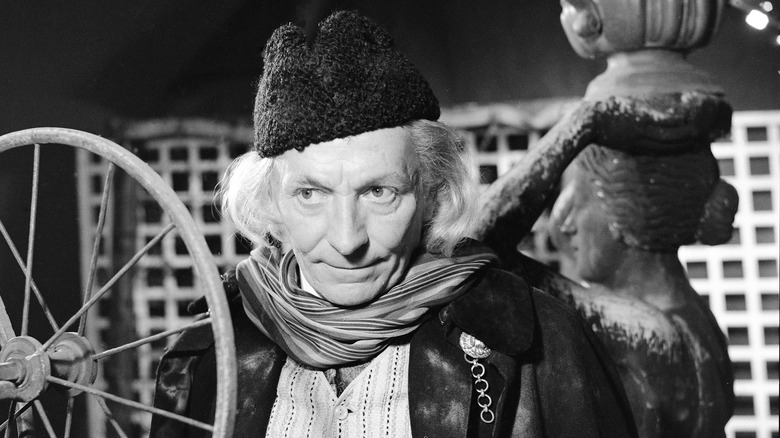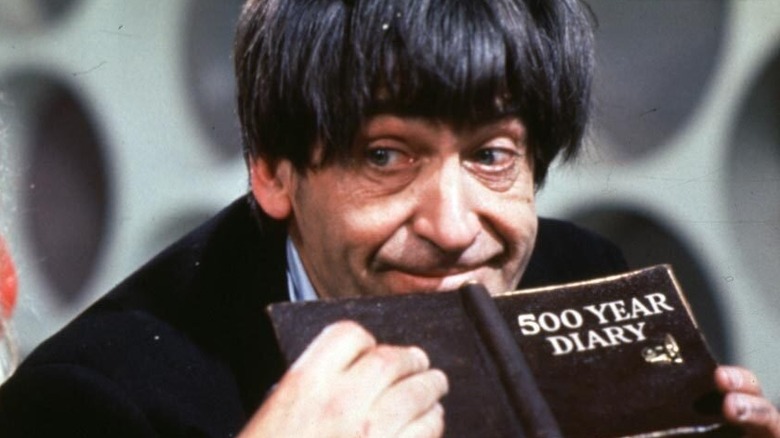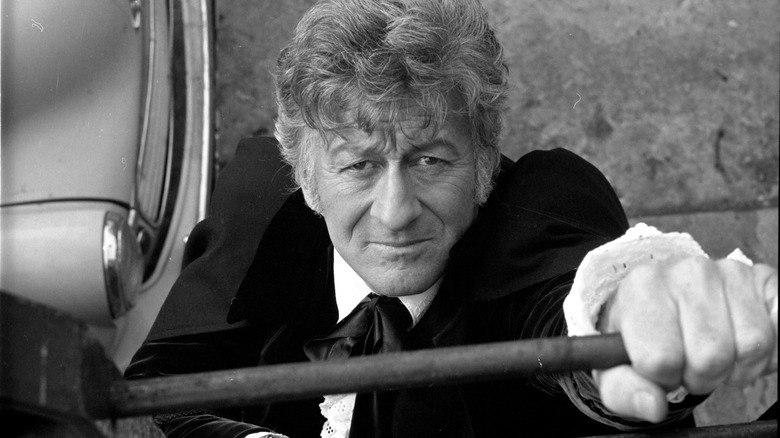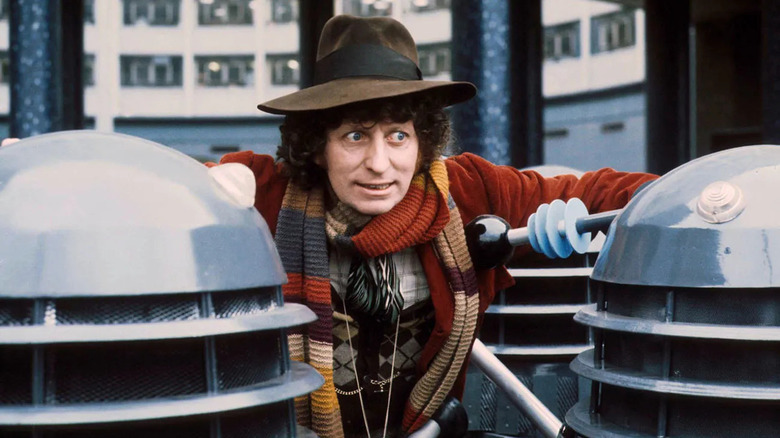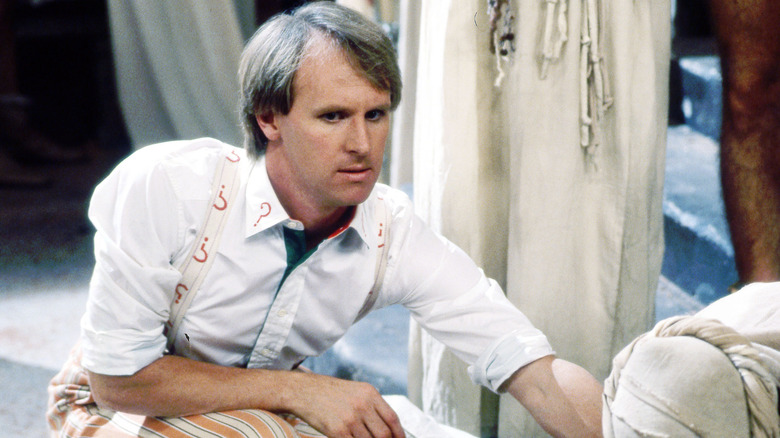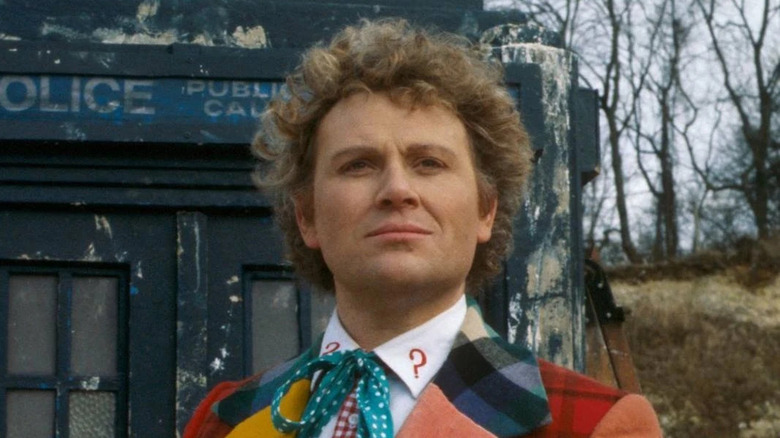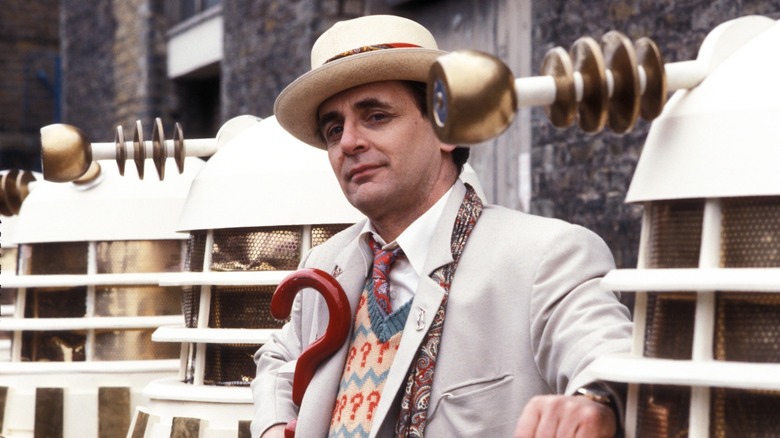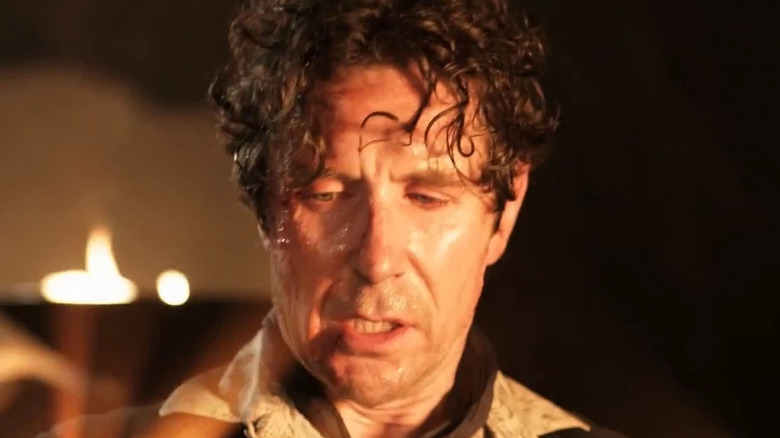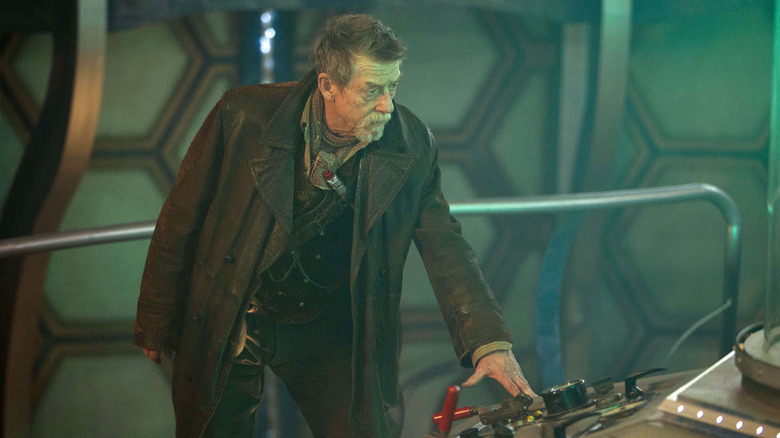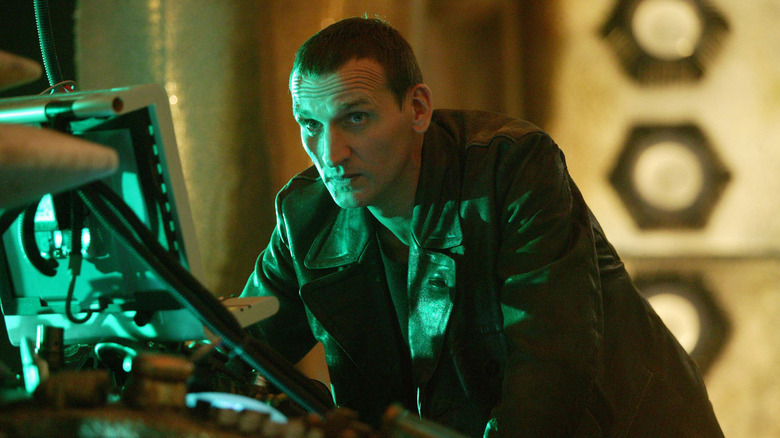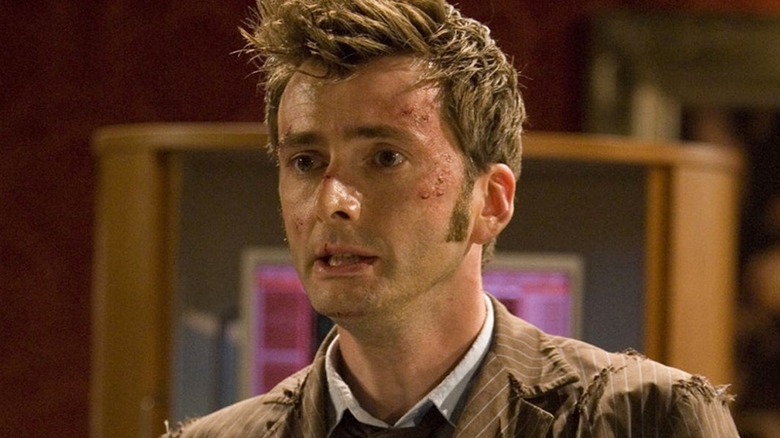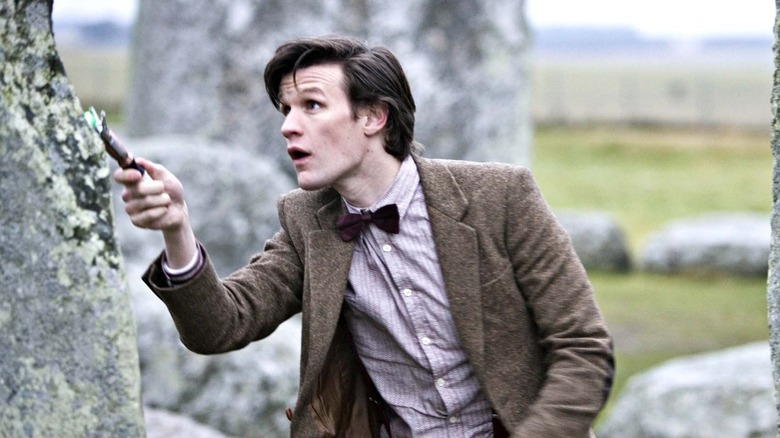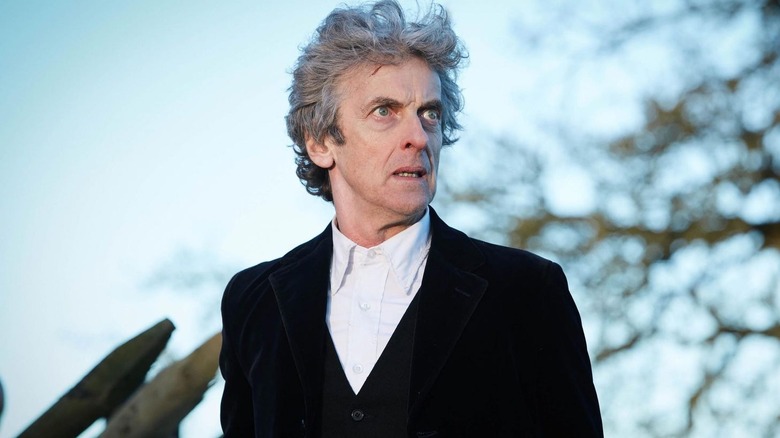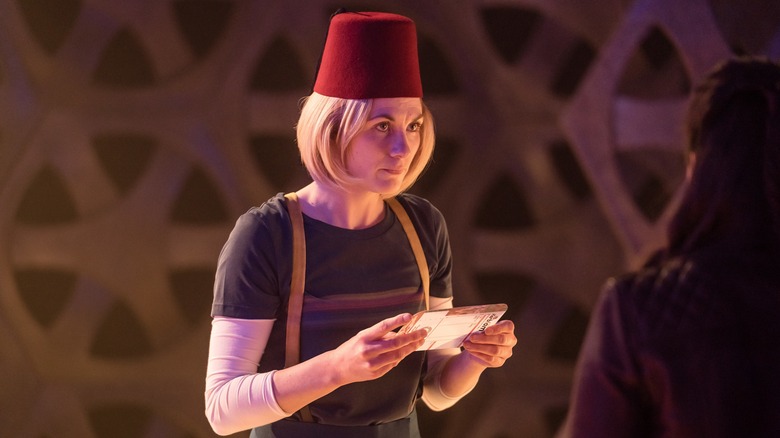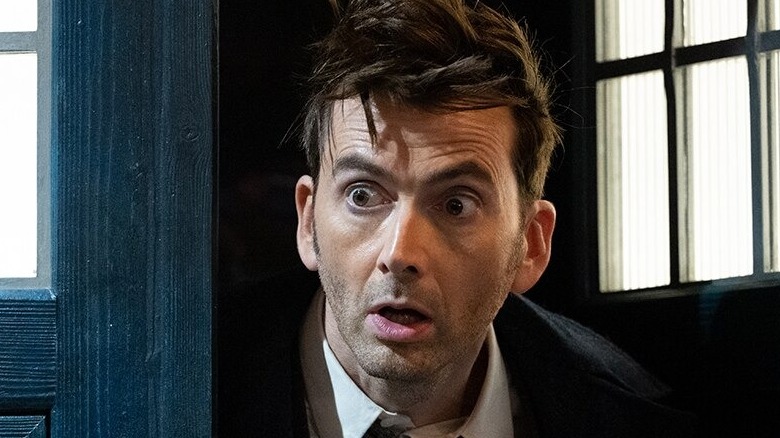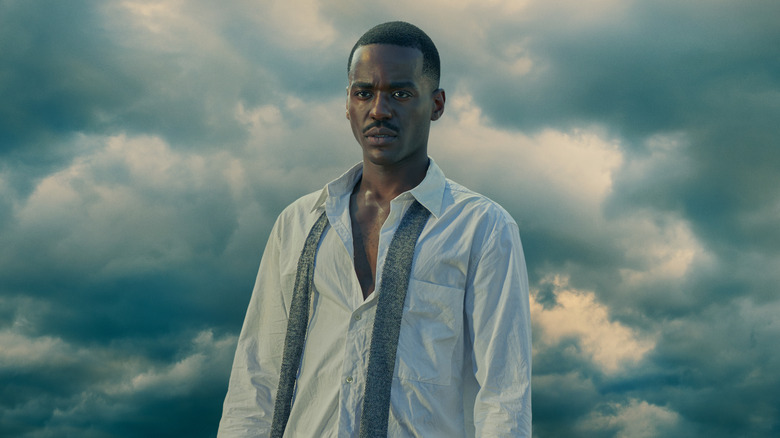All Doctor Who Doctors In Order
The BBC's long-running science fiction program "Doctor Who" is as fascinating as it is daunting to the average outsider. Perhaps one of the most alienating aspects about the show — aside from the 60 years of lore — is the constant recasting of its lead actor through reincarnation/regeneration. Just when you've gotten attached to one version of the Doctor, the character changes.
However, this tradition not only adds to the mythos of one of the most popular characters in fiction, but allows for new fans to find 15 unique, essentially seamless entry points into the series. All you have to do is find the right Doctor for you and enjoy the ride through space and time. To help you on your journey, we've run through each and every major version of the character in chronological order.
Fugitive Doctor (Jo Martin)
Main Series: 12-13 (Modern)
Notable Companion: Lee Clayton
Best Story: Series 12, Episode 5, "Fugitive of the Judoon"
As has been explored more thoroughly in the Modern Era of "Doctor Who," the Doctor did indeed have lives before they were regenerated into the "First" Doctor, whom we see in the program's inaugural 1963 series. Since this was established, there have been whispers of various original incarnations of the Doctor, as well as the appearances of multiple Timeless Children who are essentially the Doctor's forgotten juvenile incarnations.
At present, the most prominent pre-First Doctor incarnation is the Fugitive Doctor — notable for being the first Black Doctor — played by Jo Martin. "She can be a bit grumpy, a bit moody, this Doctor," Martin said of her character in an interview with the official Doctor Who magazine. "A little like [12th Doctor Peter] Capaldi, maybe. She's got an edge and a dark side to her as well as being cheeky and charming." She is one of the more morally complicated Doctors, having worked for the Gallifreyan organization The Division — the same organization responsible for erasing the Doctor's earliest memories.
First Doctor (William Hartnell)
Main Series: 1-4 (Classic)
Notable Companions: Susan Foreman, Barbara Wright, Ian Chesterton
Best Story: Series 3, "The Destruction of Time"
Going back to the "Doctor Who's" origins in 1963, we find the first numbered Doctor, as well as the first Doctor overall, played by 55-year-old Shakespearean actor and radio star William Hartnell. After spending the majority of his career playing stern old men, Hartnell was attracted to the role of the Doctor sight-unseen due to the room it gave him to play a softer, more curious and eccentric sort of character he'd seldom been offered.
The show used both Hartnell's established persona and potential range to create the First Doctor's arc from cynical time traveler to the open-hearted, deeply compassionate intellectual that more closely resembles the variations of the Doctor we see in later series. Countless fights with interdimensional monsters such as Daleks and Cybermen ultimately proved too much for him, however, the physical toll eventually forcing what was long believed to be his first regeneration in Series 4.
Second Doctor (Patrick Troughton)
Main Series: 4-6 (Classic)
Notable Companions: Jamie McCrimmon, Zoe Heroit
Best Story: Series 6, "The War Games"
Following William Hartnell's exit from the series, the actor pointed producers toward Patrick Troughton for his successor. Though Troughton — who to that point had largely been a recognizable guest star on British dramas — initially pitched a wildly upsetting "Doctor Who" portrayal that could have easily tanked the show, he eventually took over the role and is remembered as one of the best Doctors.
As the Doctor's first reincarnation (from the audience's perspective), Troughton established that each incarnation had their own identity and personality without alienating audiences. He intentionally avoided the Sherlock-esque persona producers were pushing, and leaned into a looser take on the character who listened more than he spoke. Troughton's time with the show ended when the Second Doctor was apprehended by the Time Lords and finally punished for his crimes against their order. His sentence was exile and immediate regeneration.
Third Doctor (Jon Pertwee)
Main Series: 7-11 (Classic)
Notable Companions: Jo Grant, Sarah Jane Smith
Best Story: Series 10, "Carnival of Monsters"
Incidentally, the Time Lords chose to send the Doctor to 20th Century Earth for his exile, where he — newly regenerated as the Third Doctor, played by actor and comedian Jon Pertwee — was forced to combat threats initially without the aid of his TARDIS. He eventually repaired his vessel and continued his travels, coming face to face with arch nemesis the Master (Roger Delgado) for the first time.
Pertwee left the program in 1974, during the show's 11th series. In interviews given after the fact, he said he was concerned about being trapped in the role after so many years in the TARDIS, and felt that the departure of producer Barry Letts made the climate natural for his own final bow. After failing to renegotiate a larger salary for Series 12, Pertwee bid the show adieu. His cause of death on the show was a fatal encounter with a terrifying radioactive spider queen.
Fourth Doctor (Tom Baker)
Main Series: 12-18 (Classic)
Notable Companions: Sarah Jane Smith, Harry Sullivan, K9
Best Story: Series 12, "Genesis of the Daleks"
At 40 years old when he took the role, Tom Baker was the youngest Doctor to grace the screen by about 10 years. He and the show leaned into this more youthful energy to great effect, creating a version of the character that was full of whimsy and endearing mania.
Another part of what makes his run on the show so memorable is how much they expanded the lore of the series with both the addition of characters and concepts and the extrapolation of those previously established. One of the top "Doctor Who" stories of the Baker-era is "Genesis of the Daleks," a dark, psychological exploration of the program's most prominent baddies that helped push its bounds beyond a show strictly made for children. After seven series, the Fourth Doctor met his end during a battle with the Master (Anthony Ainley), and was regenerated anew.
Fifth Doctor (Peter Davison)
Main Series: 19-21 (Classic)
Notable Companions: Adric, Vislor Turlough, Peri Brown
Best Story: Series 19, "Earthshock"
After Tom Baker's exit, the show did not return the older, wizened Doctors of the past and went even younger for his replacement, casting 31-year-old sitcom star Peter Davison as the Fifth Doctor. Tthis incarnation of the character is initially introduced alongside the Fourth Doctor as a mysterious figure called the Watcher, who then absorbs the Fourth Doctor as part of an unorthodox and uniquely dangerous regeneration.
While Baker's series widened the world of "Doctor Who," Davison's pared it back significantly, telling leaner stories that all but abandoned previous flirtations the program had with the fantasy genre — less George Lucas, more Isaac Asimov. He ultimately sacrificed himself to save his companion Peri Brown (Nicola Bryant) from a deadly poison.
Sixth Doctor (Colin Baker)
Main Series: 21-23 (Classic)
Notable Companions: Peri Brown, Mel Bush
Best Story: Series 22, "Vengeance on Varos"
Despite sacrificing his previous life to save Peri Brown, the Doctor's first act upon regenerating into his sixth incarnation (played by the more serious, dramatic actor Colin Baker) is nearly killing her in a fit of confused rage. This bizarre start to his characterization was a herald of things to come, as the Sixth Doctor is widely remembered by fans as one of the worst incarnations to date.
A large reason for this was his personality, which essentially went back to the borderline antisocial tendencies of the First Doctor, but without the benefit of a solid arc, the show's novelty, and William Hartnell's endearing performance. The Sixth Doctor was unceremoniously killed off-screen, his cause of death not yet canonized.
Seventh Doctor (Sylvester McCoy)
Main Series: 24-26 (Classic)
Notable Companions: Mel Bush, Ace
Best Story: Series 25, "Remembrance of the Daleks"
Like it did with the Fifth Doctor, "Doctor Who" sought a return to form when it introduced Scottish comedic actor Sylvester McCoy as the Seventh Doctor. Primarily, it seemed as though they wanted to refocus the character as a loveable and often hapless genius whose major flaws are silly rather than downright unlikable.
However, after this redirect was met with a harsh critical response from fans and critics alike, the writers began imbuing the character with more complexity, often hinting toward a checkered past. Sadly, neither he nor the program got much time to explore this side of him, as "Doctor Who" brushed up against its first cancellation. He was shot by an errant bullet in a TV movie that brought the show to a seemingly definitive close.
Eighth Doctor (Paul McGann)
Main Series: TV Movie
Notable Companion: Grace Holloway
Best Story: "The Night of the Doctor"
The 1996 "Doctor Who" TV movie was supposed to be the beginning of a new era for the series, led by Paul McGann. McGann was arguably the most conventional of the actors chosen to play the Doctor at the time, and portrayed the character as a dashingly heroic swashbuckler. It feels as though "Doctor Who" wanted a more solid and plausible protagonist as the 21st century loomed around the corner.
Unfortunately, the Eighth Doctor's future was cut short, and no series were spun out of the film. He was, however, brought back in 2013 for the 50th Anniversary Special, in which it is revealed that he voluntarily initiated his own regeneration in order to remake himself as a warrior capable of ending the Time War.
War Doctor (John Hurt)
Main Series: None
Notable Companions: Rose Tyler (The Moment)
Best Story: "The Day of the Doctor"
Having chosen to fight in the Time War, the Eighth Doctor is reincarnated not into a "Doctor" at all, but a warrior who denounces the title as a means of reconciling the violent path he must take. Originally, this storyline would have fit naturally within the lore of the Ninth Doctor (Christopher Eccleston). Given Eccleston's refusal to return to the role, however, showrunner Steven Moffat instead chose to create a new version of the Doctor that could be a blockbuster antagonist, complete with the performance of a well-known British actor — John Hurt.
Much of the War Doctor's arc surrounds his decision to destroy Gallifrey to end the Time War, which previously had been a shameful aspect of the Doctor's lore. It is revealed that — by working with his future incarnations, including the Tenth and Eleventh Doctors — he actually avoids destroying the planet, and merely loses the memory of this heroic act as he regenerates into his formally Ninth incarnation.
Ninth Doctor (Christopher Eccleston)
Main Series: 1 (Modern)
Notable Companions: Rose Tyler, Captain Jack Harkness
Best Episode: Series 1, Episode 6, "Dalek"
After a hiatus of several years following the 1996 TV movie, "Doctor Who" returned in 2005, this time more successfully revived to capture a new generation of fans. The inaugural Doctor of the modern era was Christopher Eccleston's Ninth Doctor, who canonically is retconned to have been regenerated from the War Doctor, but upon first appearance basically served as a blank slate for new audiences.
This isn't to say that the new team was afraid of the series' lore, but when older characters and concepts were introduced they were done so with the understanding that the majority of the audience would need enough context to appreciate them. Eccleston's Doctor, meanwhile, is a fairly straightforward sci-fi-action protagonist with some subtle flair teased here and there — the perfect leading man not to scare aware potential new fans. The actor doesn't have much affection for the role and left after only one series, his Doctor regenerating in the finale after sacrificing himself to save his companion Rose Tyler (Billie Piper).
Tenth Doctor (David Tennant)
Main Series: 2-4 (Modern)
Notable Companions: Mickey Smith, Donna Noble
Best Story: Series 3, Episode 10, "Blink"
With Christopher Eccleston easing new audiences into the world of "Doctor Who," the baton was passed to a much more openly eccentric Doctor immediately following his departure. His successor was David Tennant, then the secondary breakout of "Harry Potter and the Goblet of Fire" (behind future "Twilight" and "The Batman" star Robert Pattinson). The range brought by Tennant to the character has made him one of the most beloved actors to take on the role, and he arguably deserves the lion's share of the credit alongside successor Matt Smith for making the modern iteration of the program one of the most popular shows in the world.
The Tenth Doctor's tenure also marked the introduction of several popular characters — including Catherine Tate's all-timer companion Donna Noble — and concepts, most notably the terrifying alien statues known as the Weeping Angels. His end took place over the course of the two-part Christmas special "The End of Time," during which he reckons with own mortality and makes peace with his eventual regeneration, both establishing the concept in more vivid and emotional terms for new fans while giving this foundational character a goodbye worthy of Tennant's contributions to the series.
Eleventh Doctor (Matt Smith)
Main Series: 5-7 (Modern)
Notable Companions: Amy Pond, Rory Williams, River Song
Best Story: Series 5, Episode 10, "Vincent and the Doctor"
Following two relatively young choices to play the Doctor, both producers and viewers expected a return to the traditional, older sort of Doctor the show put forth throughout the majority of its classic run. Even Steven Moffat himself, taking over from Russell T. Davies as showrunner, told entertainment outlets that he was actively seeking a middle-aged man for the role. Instead, he wound up casting an all-but-unknown 26-year-old named Matt Smith, whose casting was criticized for his lack of professional experience and name recognition, as well as the fact that he was the youngest actor ever to play the role.
But, as readers are well aware, the rest of the story is history. Smith's off-the-wall Eleventh Doctor defined the show's modern era as much as David Tennant's take on the character did, even despite some divisive writing choices from Moffat. Poetically, viewers ultimately watch the youngest Doctor age dramatically in his eternal defense of the colonial planet Trenzalore, until he is finally allowed to rest and regenerate anew.
Twelfth Doctor (Peter Capaldi)
Main Series: 8-10
Notable Companions: Clara Oswald, Bill Potts
Best Story: Series 8, Episode 4, "Listen"
The one-two punch of David Tennant and Matt Smith — emphasized by the War Doctor story arc which united them — made anointing the Twelfth Doctor something of an unwinnable endeavor. Steven Moffat ultimately chose to go as far as possible in another direction casting-wise so as to avoid inevitable comparisons to the two predecessors, particularly Smith, whom he described as the "perfect" Doctor in an interview with Radio Times.
This led them to Peter Capaldi, a 55-year-old Scottish actor who was at the time best known for starring in the black comedy series "The Thick of It" as the blustering and endlessly profane political communications director Malcolm Tucker. He brought a similar but more empathetic fire to his role as the Doctor, which allowed him to distinguish himself from previous actors but may have altered the tone of the show too much for fans who grew up with the modern era. His final adventure reunited him with the First Doctor, after which he surrendered to a truly historic regeneration.
Thirteenth Doctor (Jodie Whittaker)
Main Series: 11-13
Notable Companions: Ryan Sinclair, Yasmin Khan, Dan Lewis
Best Story: Series 11, Episode 6, "Demons of Punjab"
The Doctor character had never been set in stone as being any one gender, race, or ethnicity, though they had been depicted as a series of white European men for the five decades of the franchise. Finally, in Series 11, with the exit of Steven Moffat (now replaced by Chris Chibnall), "Doctor Who" finally got to introduce the first female-presenting Doctor, played by Jodie Whittaker.
Ignoring the predictable sexist tantrums that followed the casting announcement, Whittaker's series were defined by a generally acknowledged decline in quality, as well as an admirable commitment to optimism and positive vibes. The Thirteenth Doctor lacks the edge that made previous incarnations feel complex and dangerous, though it also gives her the power to distinguish herself from them all the same. Like many Doctors before her, however, she eventually falls at the hands of the Master (Sacha Dhawan), and is reincarnated into a familiar form.
Fourteenth Doctor (David Tennant, again)
Main Series: None
Notable Companions: Donna Noble
Best Story: "The Giggle"
Indeed, the Fourteenth Doctor is once again David Tennant, returning to "Doctor Who" just in time for a slate of specials commemorating the show's 60th Anniversary in 2023. All three specials are effectively playing the hits to delightful effect, reuniting Tennant's fan-favorite doctor with his old companion Donna and reviving a few concepts from "Doctor Who" Classic for the modern era.
Unlike other Doctors on this list, the Fourteenth is ultimately preserved indefinitely through his novel bi-generation process, which sees him divided in two rather than replaced. He gets the happily ever after that has normally eluded his predecessors, while his successor prepares to take the spotlight for the foreseeable future.
Fifteenth Doctor (Ncuti Gatwa)
Main Series: 14-present
Notable Companions: Ruby Sunday
Best Story: Series 14, Episode 4, "73 Yards"
Ncuti Gatwa made history as the first Black actor to be cast as the main Doctor in "Doctor Who." Though Matt Smith remains the youngest Doctor yet, the show seems eager to make Gatwa the most youthful, carefree iteration of the character, as seen in both Gatwa's performance and the lighter world constructed around him by the show's writers.
